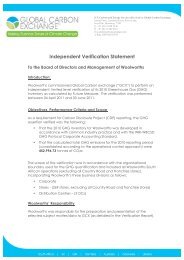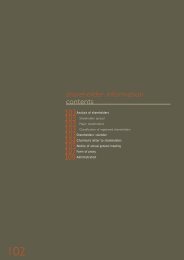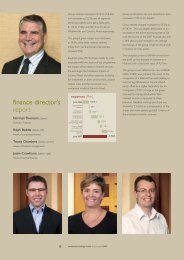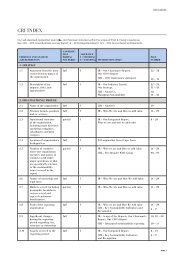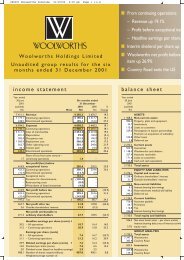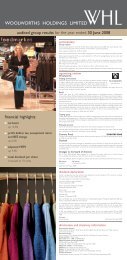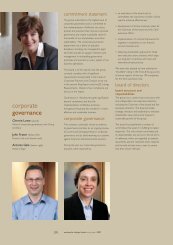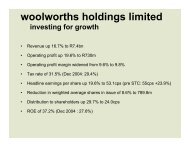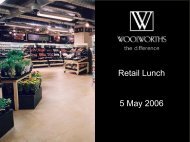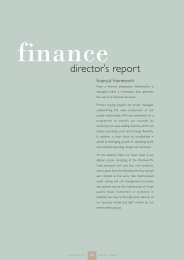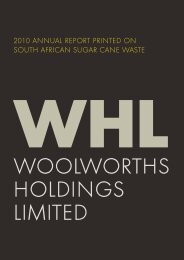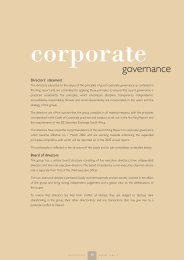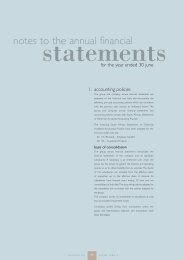WoolWorths holdings limited 2013 good BUsiness JoUrneY report
WoolWorths holdings limited 2013 good BUsiness JoUrneY report
WoolWorths holdings limited 2013 good BUsiness JoUrneY report
You also want an ePaper? Increase the reach of your titles
YUMPU automatically turns print PDFs into web optimized ePapers that Google loves.
Environment<br />
CASE STUDY: UTZ CERTIFIED COCOA<br />
In October 2012, Woolworths launched<br />
a new boxed chocolate range for<br />
which 25% UTZ Certified cocoa was<br />
sourced, as a first step on a journey<br />
that will see all Woolworths chocolates<br />
being made with certified sustainable<br />
cocoa by 2016. We started with 25%<br />
because there simply isn’t enough<br />
UTZ Certified cocoa available to<br />
meet our demand. We have since<br />
managed to increase to sourcing<br />
50% UTZ Certified for this range.<br />
Our progress is tracked on our UTZ<br />
Cocoa Barometer which can be found<br />
on our website: www.woolworths.<br />
co.za/<strong>good</strong>businessjourney<br />
UTZ Certified is one of the world’s<br />
leading sustainability programmes<br />
for coffee, cocoa and tea. It’s a<br />
comprehensive programme that<br />
helps the farmers learn to improve<br />
the quality and yield of their cocoa<br />
while reducing their impact on<br />
the environment and enabling<br />
them to take better care of their<br />
workers and families. Farmers<br />
also learn business skills, and their<br />
operational management is audited<br />
by independent third parties. This<br />
ensures that if a raw material is<br />
UTZ Certified, you have the assurance<br />
that it has been grown and harvested<br />
responsibly.<br />
Another critical factor for Woolworths<br />
is that the UTZ Certified Codes of<br />
Conduct include explicit requirements<br />
that prohibit child labour based on<br />
International Labour Organisation<br />
(ILO) conventions.<br />
Even though Woolworths is a small<br />
player in terms of the global market,<br />
we are still committed to working<br />
with the industry, independent<br />
organisations, international agencies<br />
and others to encourage sustainable<br />
practices in the cocoa industry. We<br />
want to help producers become more<br />
sustainable, improve the management<br />
of labour, protect the environment and<br />
ensure the commercial viability of<br />
their organisations.<br />
ANIMAL WELFARE<br />
As retailers, we believe, it is our ethical<br />
obligation to ensure that our suppliers<br />
treat the animals in our supply chain in the<br />
most humane way possible.<br />
We believe animals should have lives<br />
worth living. From birth to death, they<br />
should enjoy the five freedoms:<br />
1. Freedom from hunger and thirst,<br />
2. Freedom from discomfort,<br />
3. Freedom from pain, injury or disease,<br />
4. Freedom to express normal behaviour,<br />
5. Freedom from fear and distress.<br />
We are committed to continuous<br />
improvement in all aspects of animal<br />
health and welfare including livestock<br />
management and husbandry, housing,<br />
animal feed, farm hygiene, environment,<br />
transport, slaughter and disposal of<br />
animals regarded as “by-products”.<br />
These aspects will be addressed in<br />
detail in our various species-specific<br />
Codes of Practice.<br />
We will ensure that the animals used in<br />
the production of all our foods will be<br />
produced to our specifications by known<br />
suppliers, and that we will be able to<br />
trace the food back to the farms from<br />
where it was sourced.<br />
To ensure that high animal welfare<br />
standards are maintained and<br />
continuously improved, our trained<br />
animal welfare specialists will at least<br />
annually visit and inspect all our South<br />
African abattoirs and processing plants<br />
and check that they and their supplying<br />
farms comply fully with our product<br />
specifications and animal welfare Codes<br />
of Practice. We will also periodically visit<br />
and inspect our foreign abattoirs.<br />
We do not permit:<br />
• Animal testing – we have never asked<br />
or commissioned our private label health<br />
and beauty suppliers to conduct testing<br />
on animals. Our animal welfare policy<br />
requires that suppliers did not use any<br />
raw materials tested on animals after<br />
1 January 2001. Woolworths’ entire<br />
private label range of toiletries and<br />
cosmetics have not been tested on<br />
animals and have been approved by<br />
Beauty Without Cruelty (BWC).<br />
• Products made from real fur.<br />
• Selling of eggs from caged birds.<br />
• Our health and beauty suppliers of our<br />
private label to use ingredients that are<br />
by- products of the food industry.<br />
• The use of duck feather and down that<br />
is not a by-product of the food industry<br />
in homeware.<br />
• Woolworths is committed to addressing<br />
the issue of mulesing of wool-producing<br />
Merino sheep. Mulesing is the surgical<br />
removal of strips of wool-bearing<br />
wrinkle skin from around the breech of<br />
a sheep. Mulesing is a common practice<br />
in Australia as a way to reduce the<br />
incidence of flystrike on Merino sheep.<br />
Although mulesing is not practised in<br />
South Africa, Woolworths will continue<br />
to monitor local South African suppliers to<br />
ensure that they conform to the position<br />
statement mandated by Cape Wools SA.<br />
WHL 72 / <strong>2013</strong> GOOD BUSINESS JOURNEY



